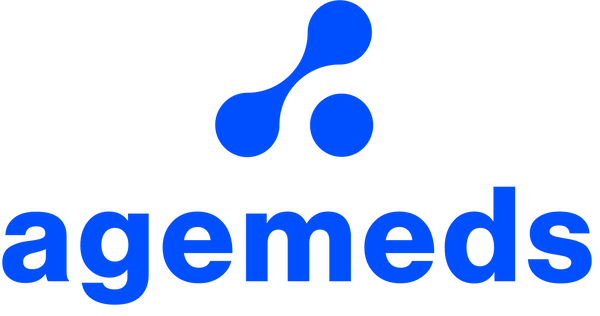NMN and NAD+
Sirtuins are a group of proteins that play an essential role in the regulation of the aging process. Among other things, they are involved in DNA repair, gene expression and energy metabolism. Studies have shown that activation of sirtuins can lead to longer life and delay the onset of age-related diseases[1]. By regulating the expression of genes associated with aging, sirtuins can help slow down the aging process and promote healthy aging.
David Sinclair, a renowned scientist in the genetics and biology of aging, has conducted extensive research on the benefits of nicotinamide mononucleotide (NMN) supplementation[2]. NMN is a precursor to nicotinamide adenine dinucleotide (NAD+), a coenzyme that plays a key role in cellular metabolism and energy production. Sinclair's research has shown that NMN supplementation can increase NAD+ levels, leading to improved cellular function and delaying age-related decline[3]. This groundbreaking discovery opened up new possibilities for the development of anti-aging therapies.
Research has also shown a correlation between NAD+ levels and biological age. As we age, our NAD+ levels decline, leading to a decrease in cellular function and an increase in age-related diseases[4]. However, studies have shown that supplementation with NAD+ precursors such as NMN and nicotinamide riboside (NR) can increase NAD+ levels and mitigate many factors associated with aging[1]. For example, a study by Gomes et al. found that NMN supplementation improved vascular function and decreased the biological age of mice[5]. These findings suggest that NAD+ precursors such as NMN could have significant potential as antiaging supplements for humans.
 Potential benefits of NMN and NAD+ supplementation in humans
Potential benefits of NMN and NAD+ supplementation in humans
Studies have shown that NMN and NAD+ supplementation may have potential benefits for age-related diseases[6]. David Sinclair, a renowned scientist in the field of genetics and biology of aging, has conducted research on the effects of NMN and NAD+ on age-related diseases[1]. In a study by Sinclair's team, feeding mice NMN showed promising results in improving age-related diseases[7]. Additionally, a study designed to test the hypothesis that restoration of NAD+ concentration may have beneficial effects on NVC responses in aging showed positive results[5]. These findings suggest that NMN and NAD + supplementation could potentially ameliorate age-related diseases in humans.
NMN and NAD+ have also gained popularity in the biohacking and longevity communities for their potential to increase lifespan and improve overall health[4]. By increasing NAD+ levels, it has been shown to moderate many factors associated with aging, including inflammation and cell damage[4]. In addition, Sinclair's research has shown that NMN supplementation can improve mitochondrial function, which is key to energy production and overall health[1]. These findings suggest that NMN and NAD+ supplementation could potentially improve longevity and overall health.
In addition to potential benefits for age-related diseases and longevity, NMN and NAD+ may also have the potential to improve overall health and vitality[2]. By increasing NAD+ levels, NMN can improve cellular function and energy production, leading to increased vitality and improved overall health[6]. Additionally, reducing inflammation and cell damage can lead to a healthier immune system and lower risk of chronic disease[4]. While NMN and NAD+ supplementation is not a panacea for health problems, it can potentially contribute to a healthier and more vibrant life[8]. More research is needed to fully understand the potential benefits of NMN and NAD+ supplementation, but current findings suggest promising potential for improving overall health and vitality.
Results of NMN studies to date
Nicotinamide mononucleotide (NMN) has shown promising results in a number of studies investigating its potential to improve health and slow the aging process[1]. In an unpublished study by David Sinclair of Harvard, NMN was found to have remarkable potential as an NAD enhancer[6]. Another study by Sinclair's lab showed that feeding mice NMN could restore cellular levels of NAD+, which has beneficial effects on age-related declines in blood flow and other factors[9]. These findings suggest that NMN may have the potential to improve physical and cognitive function as well as increase lifespan.
Although the results of these studies are promising, the effects of NMN on human health remain to be investigated[7]. More research is needed to fully understand the specific mechanisms by which NMN exerts its effects, as well as to determine the optimal dosage. Additionally, it is important to note that not all NMN supplements are created equal[10]. The quality and purity of NMN supplements can vary widely and it is essential to choose a reputable source to ensure safety and effectiveness. For example, tested and certified NMN 99.9% from agemeds.com.
Despite the need for further research, the potential benefits of NMN have led to increased interest in biohacking and other anti-aging interventions[11]. By targeting NAD+ and other key pathways associated with aging, NMN has the potential to reduce biological age and improve overall health and well-being. As research continues to examine the effects of NMN on human health, it is important to approach these interventions with caution, safety and efficacy above all[12]. By staying informed and making informed decisions about our health, we can work towards a healthier and more vibrant future[2].
FAQ
Q: What is the role of NMN and NAD+ in slowing the aging process? A: NMN and NAD+ play a vital role in cellular energy production and are closely related to the aging process. NAD+ is a coenzyme involved in various biological processes, including DNA repair and gene expression, while NMN is a precursor for NAD+ synthesis. Both compounds are key to maintaining cellular health and resistance, which can help slow the aging process.
Q: What role do sirtuins play in regulating aging? A: Sirtuins are a class of proteins that play a key role in regulating cellular health and aging. They are involved in various cellular processes such as DNA repair, regulation of inflammation and energy metabolism. Through their interactions with NAD+, sirtuins help maintain cellular homeostasis and promote longevity, making them important targets for research into aging and age-related diseases.
Q: What are the potential benefits of NMN and NAD+ supplementation in humans? A: Studies have shown that NMN and NAD+ supplementation may have potential benefits in addressing age-related diseases, improving metabolic function, and improving overall health and vitality. In addition, these compounds have been investigated for their potential role in biohacking and longevity, which has generated interest in their use as anti-aging interventions.
Q: What are the promising findings from existing NMN studies? A: Existing studies have shown promising results regarding the potential benefits of NMN supplementation. These findings include improvements in metabolic function, cellular resistance, and age-related physiological changes. However, further research is needed to fully understand the long-term effects and potential applications of NMN in human health and aging.
Q: What should be considered regarding the quality of NMN supplements? A: When considering NMN supplements, it is important to prioritize quality and purity. Ensuring that the NMN product is manufactured by reputable companies and following good manufacturing practices can help alleviate concerns about product quality and safety. Additionally, it is recommended to consult a healthcare professional before starting any new supplement.
In conclusion, the science behind aging and the potential role of NMN and NAD+ in slowing it down is a promising area of research. The role of sirtuins in the regulation of aging and David Sinclair's research on the benefits of NMN shed light on the relationship between NAD+ levels and biological age. Studies show us the potential benefits of NMN and NAD+ supplementation in age-related diseases and in biohacking for longevity. Although studies on NMN have shown promising results, more research is needed to fully understand its effects, especially in terms of quality. Overall, the potential of NMN and NAD+ to improve overall health and vitality is an exciting area of research with promising implications for the future.
-
The Science Behind NMN–A Stable, Reliable NAD ... . (nd) Retrieved January 13, 2024, from www.ncbi.nlm.nih.gov/pmc/articles/PMC7238909/
-
NMN - let's slow down aging . (nd) Retrieved January 13, 2024, from www.maxxwin.cz/clanek-nmn-zpomalme-starnuti
-
Anti-Aging Breakthroughs: The Impact of David Sinclair ... . (nd) Retrieved January 13, 2024, from c60-france.com
-
NMN - magic molecule to slow down aging . (nd) Retrieved January 13, 2024, from codeoflife.cz
-
Nicotinamide mononucleotide (NMN) supplementation ... . (nd) Retrieved January 13, 2024, from pubmed.ncbi.nlm.nih.gov/31015147/
-
NAD Booster NMN Increases Lifespan in Unpublished Study . (nd) Retrieved January 13, 2024, from www.nad.com
-
David Sinclair's anti-aging science . (nd) Retrieved January 13, 2024, from www.harvardmagazine.com/node/57124
-
NMN - a molecule that can slow down aging . (nd) Retrieved January 13, 2024, from www.systers.bio
-
Nicotinamide mononucleotide (NMN) supplementation ... . (nd) Retrieved January 13, 2024, from www.ncbi.nlm.nih.gov/pmc/articles/PMC6815288/
-
NAD+ boosters: NR, NMN, and how they affect sirtuins . (nd) Retrieved January 13, 2024, from www.foundmyfitness.com/episodes/nad-boosters-nr-nmn-sirtuins
-
The Anti-Aging Supplements David Sinclair Takes . (nd) Retrieved January 13, 2024, from novoslabs.com
-
Human Clinical Trials of NMN for Safety and Effectiveness . (nd) Retrieved January 13, 2024, from www.lifespan.io

